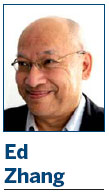Corrupt officials can derail economy
Updated: 2013-06-14 09:37
By Ed Zhang (China Daily)
|
|||||||||||

The trial of the former railways minister Liu Zhijun highlights the need to keep corruption at bay
Interesting things tend to happen in China when trading is closed for holidays. The recent Dragon Boat Festival holiday, from last weekend to June 12, is a case in point.
The day before the holiday began, the former railways minister Liu Zhijun, who was placed under official investigation in February 2011, appeared in a Beijing court on corruption charges.
The justice department confiscated 374 unlawfully obtained residences worth more than 800 million yuan ($130 million, 98 million euros) and 64 million yuan in cash, the trial was told. The suggestion is that much of that may have come his way as bribes from businesses eager to be suppliers to the largest railway development program ever seen.
There was no mention in court of Liu's private life, or of claims that he was active in seeking casual relationships with women.
Liu's lawyer was keen to emphasize Liu's alleged extraordinary feats as one of the country's key economic administrators. With Liu at the helm, the Chinese rail system had grown so fast that it could take 100 million more passengers and handle 200 million more tons of cargo a year, the lawyer said.
That defense holds a wider significance: that China still has a lot to learn in managing its ambitious and capable, but sometimes ill-disciplined and overly daring, administrative officials.
Development that is dominated by government is a risky game, the economist Wu Jinglian says in his new book about China's high-speed rail program. There may be excellent results initially, but sooner or later there will also be waste and corruption, and competition and creativity will be stifled.
China now faces a huge challenge: how to handle the next stage of its economic development.
The multi-trillion-yuan high-speed rail program is small fry compared with the national urbanization program, in which between 300 million and 400 million rural people will shift to cities to live and work.
How many county chiefs are there out there who have ambitions to don the more appealing title of mayor? And how many mayors have their minds set on huge, ambitious local development projects, be they new public buildings or industrial zones?
The risk Wu the economist refers to is a reality, as reflected in a National Audit Office report published on June 10 that says 36 local governments (including 15 provinces and 15 provincial capital cities) had total debt of 3.85 trillion yuan in February, more than 80 billion yuan of that irregularly used.
Sixteen were running debt that was more than double the value of their assets, the highest being 219 percent.
How can the powers that be prevent local and departmental officials embarking on ambitious development projects from seeking ever increasing personal gain at the same time?
It has taken the justice system two years and four months to bring Liu to trial and retrieve millions of yuan - and this is just one case. Any more such cases would be like poison to the economy.
Of course, it is next to meaningless to talk about laissez-faire economics in East Asia. Various administrative agencies are expected to play a role in setting up new industries and introducing big changes.
Yet, following the same logic, the more a society counts on administratively led development, the more it should able to manage its officials, to regulate their power, to measure their merits and their shortcomings, and to let them know where their limits are.
As with the building of high-speed rail, China needs to show the world that it has what it takes to keep corruption at bay.
The author is editor-at-large of China Daily.
(China Daily European Weekly 06/14/2013 page13)
Today's Top News
List of approved GM food clarified
ID checks for express deliveries in Guangdong
Govt to expand elderly care
University asks freshmen to sign suicide disclaimer
Tibet gears up for new climbing season
Media asked to promote Sino-Indian ties
Shots fired at Washington Navy Yard
Minimum growth rate set at 7%
Hot Topics
Lunar probe , China growth forecasts, Emission rules get tougher, China seen through 'colored lens', International board,
Editor's Picks

|

|

|

|

|

|





